After eight months of hardship, the New Zealanders’ occupation of Gallipoli came to an end in December 1915. The evacuation was one of the few successes in the campaign, yet why did some New Zealanders write about the withdrawal with bitterness?
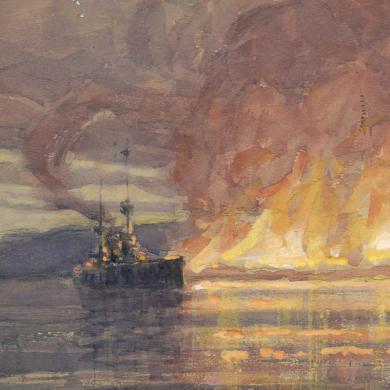
Geoffrey S Allfree's 'The evacuation of Suvla Bay', 1915. Image courtesy of Alexander Turnbull Library, Ref: A-176-003.
‘We had been sizzled in the heat, tortured by flies and thirst, and later nearly frozen to death. It was hard to be told we must give it up. But it was not our wasted energy and sweat that really grieved us. In our hearts it was to know we were leaving our dead comrades behind.’ – Jack Linton Young Martyn
The onset of winter in late 1915 brought cold rain, icy wind and snow to Gallipoli. The deteriorating conditions, the failure of the August Offensive, and the Ottomans’ growing strength, finally convinced the British to order evacuation of Anzac on 22 November. Planning moved quickly and, in contrast to the rest of the campaign, efficiently. For reasons of field security, the men were told that units were being sent to rest at Lemnos, but rumours of evacuation were rife. It was hard to miss the removal of stores and the lack of new supply deliveries, among other changes to the normal routine.
The evacuation of the 36,000 troops from Anzac began on 15 December, with batches shipped out each night. Support troops and reserves went first, and the fighting units thinned out until only 10,000 remained on 19 December. That night, in a carefully coordinated withdrawal from the front-line trenches, these men too were moved out. The Ottoman forces did not interfere with the evacuation at any point, although we do not know if this was deliberate or because of the Allies’ deceit. At 4.10 am on 20 December, the last men to leave Anzac Cove, a small party waiting for stragglers, boarded their boat and pushed off into the darkness.
After eight months of hardship, the New Zealanders’ occupation of Gallipoli was over. The evacuation was one of the few successes in the campaign. Yet why did some New Zealanders write about the withdrawal with bitterness?
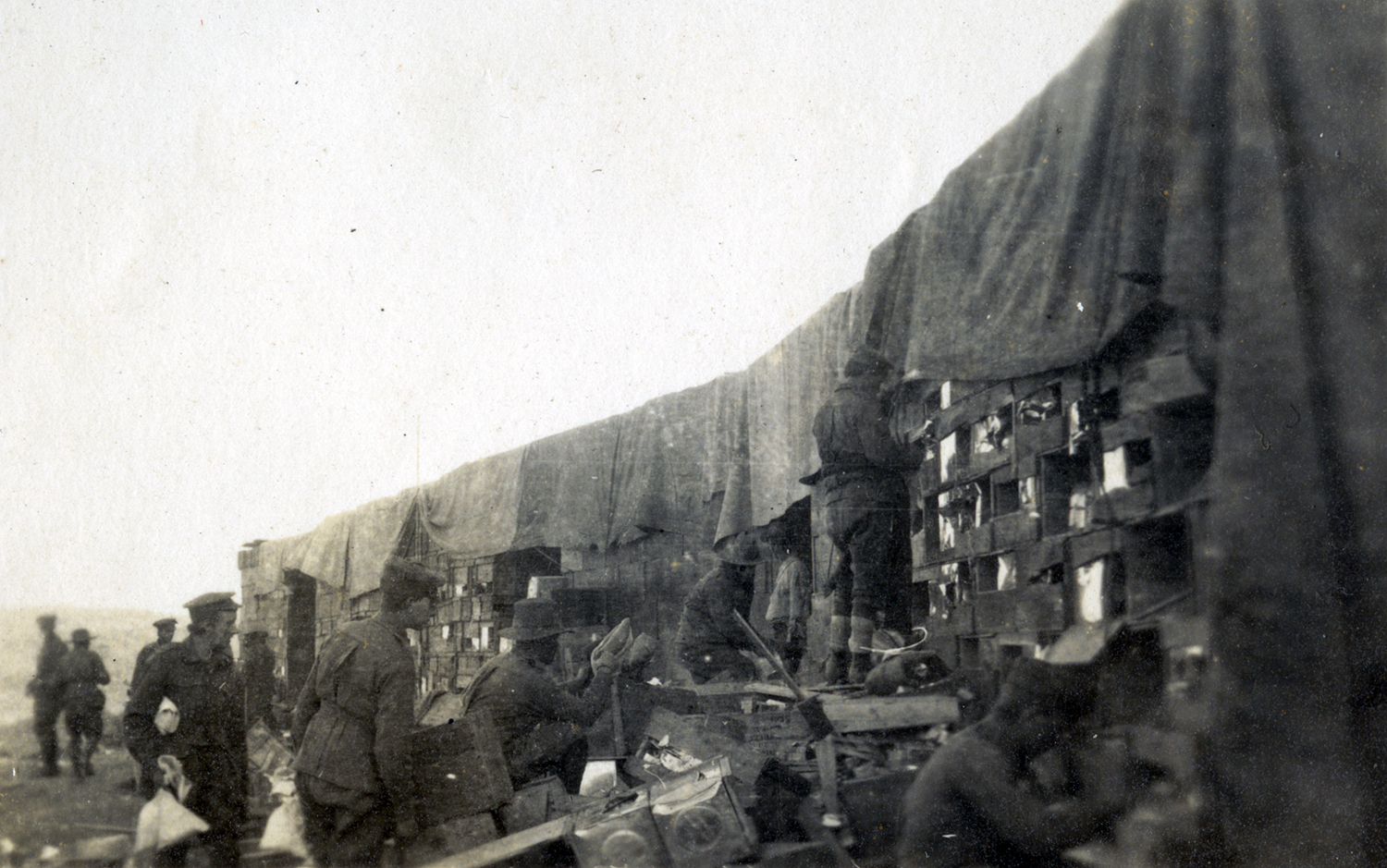
Surplus stores were thrown open to the troops during the evacuation – providing a welcome change in their diet. This photo from mid-December 1915 shows stacks of supplies on the beach at Anzac Cove with soldiers helping themselves. Image courtesy of Wairarapa Archives, Ref: 11-72/4-2-21.
Thousands of New Zealanders were killed or wounded in the Allies’ effort to take the Gallipoli Peninsula from the Ottomans, and the thought of withdrawing was shocking to many of the survivors. Albert Newton expressed this sentiment in a letter home to his family in Southland: 'It came as a blow to us when word came to get out, after the large number of brave men who had laid down their lives there and the hard struggle we had to take and hold the positions we had gained.'
Trooper Jack Linton Young Martyn articulated a similar sentiment in a letter home to his mother:
My goodness, Mother, how it did go to our hearts—after all we had gone through—how we had slaved and fought—fought and slaved again—and then to think that we had been sizzled in the heat, tortured by flies and thirst, and later nearly frozen to death. It was hard to be told we must give it up. But it was not our wasted energy and sweat that really grieved us. In our hearts it was to know we were leaving our dead comrades behind. That was what every man had in his mind.
Rather than feeling relief that the doomed Gallipoli Campaign was coming to an end, Newton and Martyn lamented having to give up the positions that the Allies had taken and leaving behind their fallen comrades.
Martyn, like others, also considered evacuation a cowardly act. In his letter he went on to say, ‘We thought, too, of you people in New Zealand and what you might think of us. Believe me, it is far harder to screw one's courage up for running away than it is to screw it up for an attack!’ George Tuck saw more valour in fighting a hopeless battle, reflecting in his diary that ‘I am no hero, but I would sooner go over the ridge in frontal assault with all its chances of death with honour than do this thing.’
.jpg)
A soldier pays his final respects in a cemetery at Anzac Cove, Gallipoli, shortly before evacuation. Image courtesy of Wairarapa Archive, Ref: 11-72/4-2-19.
Tuck also resented the British decision to withdraw from the failed campaign:
“They” know best, the enterprise a failure. The only consolation, the Australasian troops did all – & almost more than all – that a man could do. Let them take us home.’ Similarly, in a letter home to his father in Timaru, George McDonald pondered on ‘the sacrifice asked of the colonies for this little part of the Peninsula…. I know the casualties on the Peninsula were 100,000. For the short time we were there that is scandalous…
Key to the Allies’ successful evacuation was keeping it secret from their Ottoman enemy. The Turkish Fifth Army units on the hills above Anzac vastly outnumbered the occupiers, and as troop numbers and artillery dwindled, the Allied position became increasingly precarious. The possibility of the Ottomans overrunning the Anzac sector before all the troops had been evacuated preyed on the minds of those left guarding the position.
Sergeant Roland Chadwick of the New Zealand Field Ambulance – one of the last units to leave – wrote on 18 December that ‘We have now only a mere handful of men left here and if the Turks only knew they could simply walk over and take possession of all the ground we have taken from them since we first landed, and make us prisoners besides.’
Denying the Ottomans much of the Allied materiel led to some spectacular scenes. Artillery pieces were dragged down from the hills, ammunition buried, biscuit tins destroyed and rum jars smashed. As Fred Waite later wrote, ‘everything of value to the Turk was made valueless’. The stores – usually strictly guarded – were thrown open to troops. Chadwick recorded in his diary how they dispensed with the Christmas rations: 'we had to get rid of these somehow as we couldn’t find room in our kits for them. So we made beasts of ourselves and crammed them all in to us – salmon, fruit salad, oranges, gooseberries, raisins, sardines and Ideal [evaporated] milk.’ Stores that couldn’t be removed (or consumed) were stacked up on the beach, ready for a large bonfire that followed the Allies’ withdrawal.
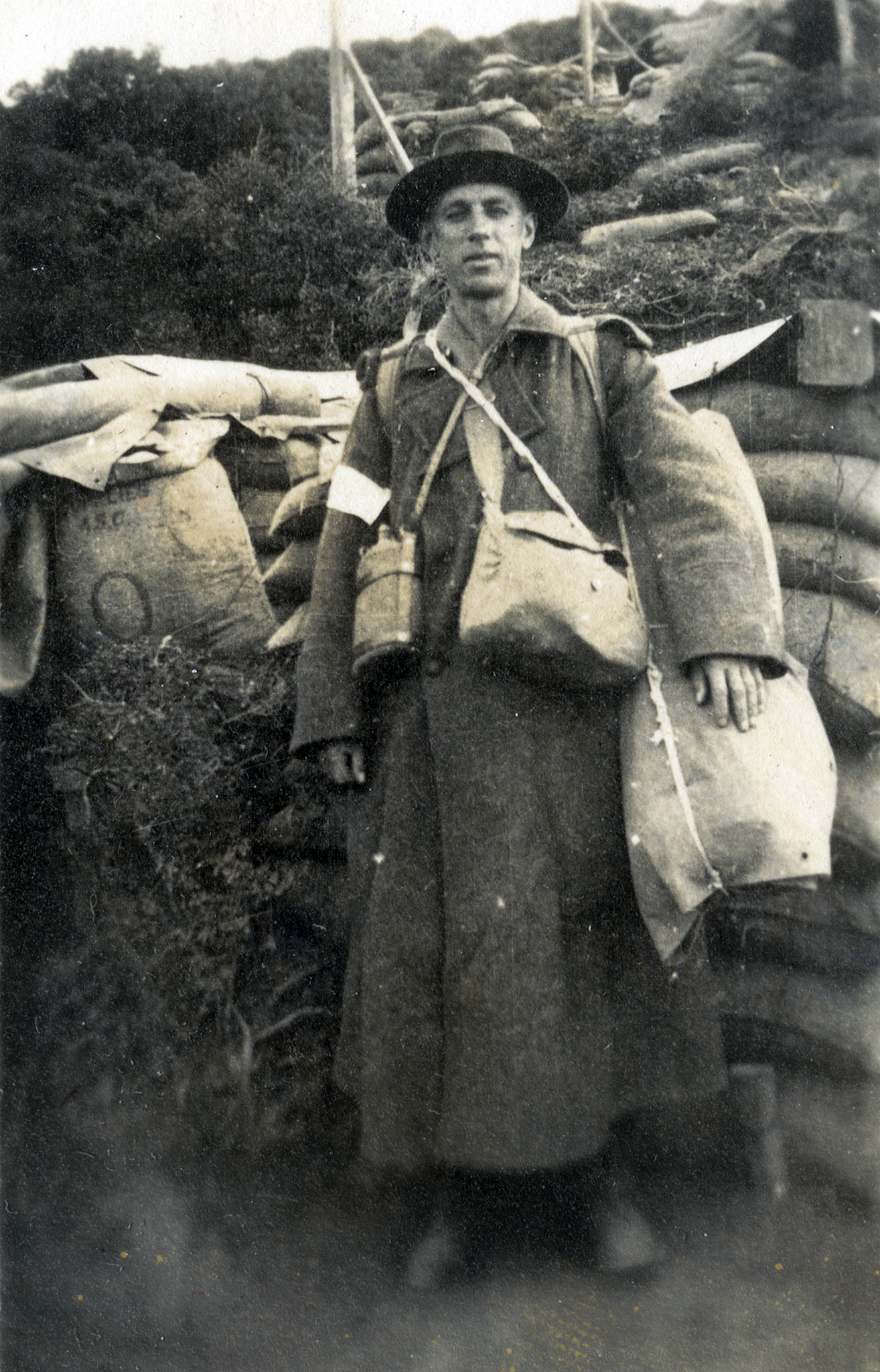
Captain Norman Prior ready to be evacuated from Anzac Cove with his belongings - including water bottle, a small and large kitbag and probably a back-pack. The white patch on the sleeve probably shows the red cross, identifying him as medical staff. Image courtesy of Wairarapa Archive, Ref: 11-72/4-2-28.
Of course, not all soldiers were upset by the idea of leaving. In a letter to his father, Douglas Rawei McLean described how he came to terms with the departure: ‘When we first learnt that the evacuation was a certainty we were at first incredulous & afterwards a bit down-hearted…. However we soon came to understand that it must be for the best & everybody entered into the spirit of the thing and put in their spare time preparing surprises for Jacko [the Ottomans] when he came over.’ He elaborated: ‘Devices, some worked by candles, some by tins of water rigged up to fire old & broken rifles hours after the last man had left the trenches. Bombs which exploded on a spring being released are in all parts of odd places. Altogether the first party of Turks that came over were due to have a few casualties.’
On the last night, while feeling the strain of the suspense, Roland Chadwick spent some time pinning sketches and notes on the wall of his shelter for ‘Johnny Turk’. Two of these notes read ‘Goodbye Johnny, we will see you again soon, probably on the Suez Canal,’ and ‘Remember you didn’t push us off, we simply went.’
Early on the morning of 20 December, the final garrison units – or ‘die-hards’ – made their way down from the front lines. Major Charles Powles was among them, and recalled the poignant descent. ‘Through the silent deres they marched, and past the silent dead, over whom loving comrades had set up crosses of remembrance in those last days. "I wonder if they hear us," passed through many a mind, and a great regret came welling up—a regret that they were being abandoned and the task not done.’ Shortly after their departure, a salvo from naval vessels offshore set alight the leftover supplies on the beach.
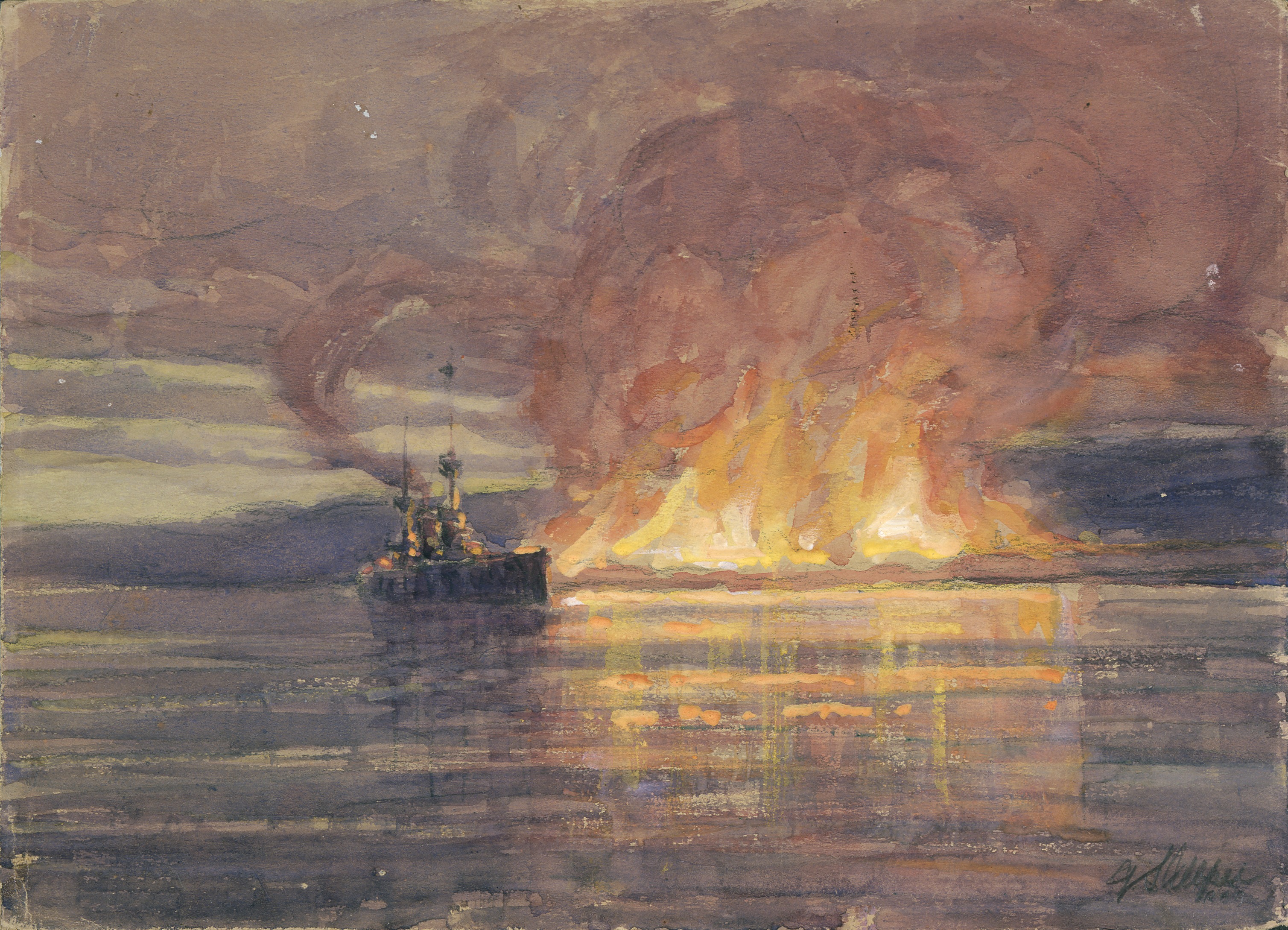
Geoffrey S Allfree's 'The evacuation of Suvla Bay. The burning of a million pounds worth of stores; last lighter coming away as dawn broke', 1915. Image courtesy of Alexander Turnbull Library, Ref: A-176-003. Charles Pearce witnessed the conflagration while on a naval vessel offshore, noting that it was 'a splendid sight to see the flames leap up simultaneously on the various beaches.'
Trooper Edwin McKay’s recollection reveals a range of opinions about the departure:
When the ship had its overcrowded quota for that night, we moved slowly and noiselessly away from the grave of all our hopes; hopes so nearly realised by the selfless valour of those who had gone there before us. I stood on deck, looking back with mixed feelings at the broken skyline showing boldly through the murk…. Someone said “We won those ridges then we lost them, and now we’re leaving our cobbers behind. It’s damnable.” … Another said, ‘Thank God we’re leaving that bloody death-trap for ever!” I listened in silence.
The Allies suffered not one casualty during the evacuation. Their plan to withdraw thousands of troops and tonnes of supplies from a dangerous position had been flawlessly executed, in stark contrast to the disastrous invasion in April that year. At home, the government and the public welcomed news of the successful evacuation with relief.
Shortly after the evacuation was announced, the editor of The Dominion reminded the newspaper’s readers to separate sentimentality from strategy:
The people of New Zealand cannot help regretting that the Dardanelles campaign, in which their own troops have played such a heroic part, cannot be crowned with success. But we are not going to whine and whimper about it. If our men can do better service for the Empire in some other theatre of the war we will not complain about their withdrawal from Gallipoli. Nothing can deprive the New Zealanders and Australians of the everlasting honour which they have won on that famous battleground.
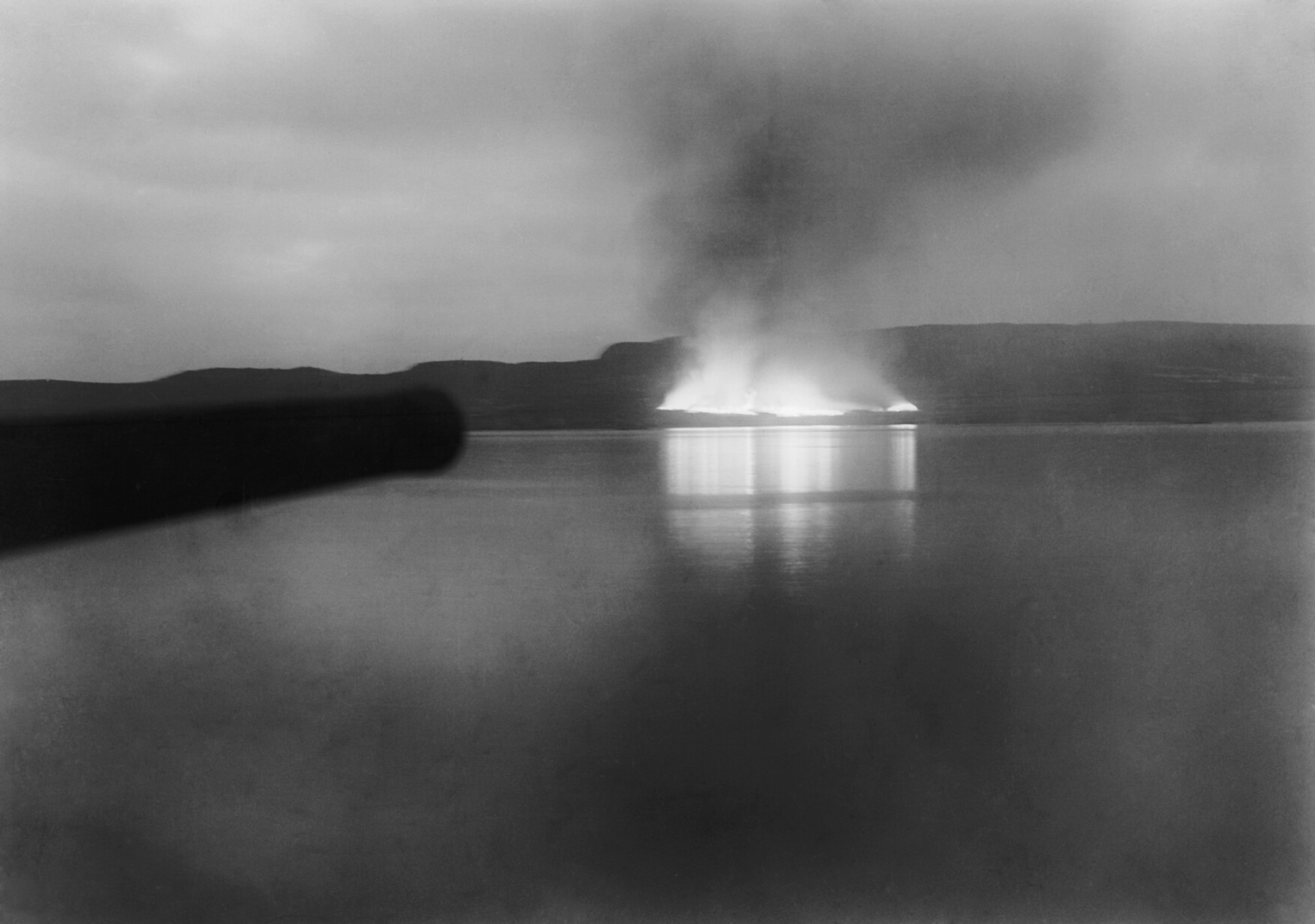
Distant view from the battleship HMS Cornwallis of stores burning on the beach after the evacuation of Suvla Bay, December 1915. © IWM (Q 13679)